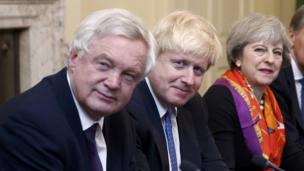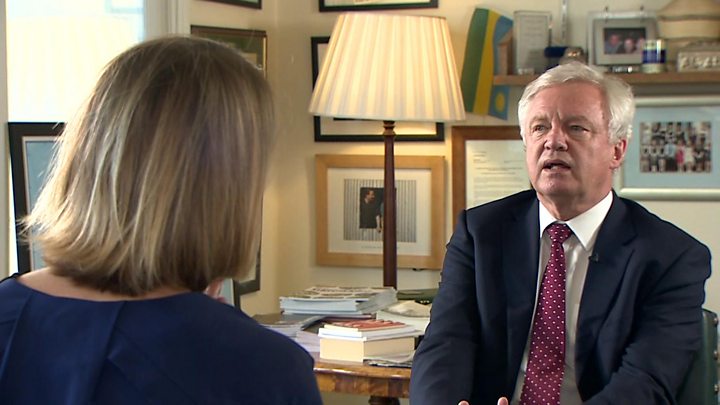 GETTY IMAGES
GETTY IMAGES
Boris Johnson has resigned as Foreign Secretary amid a growing politic a crisis over the UK's Brexit strategy.
He is the second senior cabinet minister to quit within hours following Brexit Secretary David Davis's exit.
His departure came shortly before Theresa May began addressing Parliament about her new Brexit plan, which has angered many Conservative MPs.
She said she did not agree with the two ex-ministers about "the best way to honour" the result of the 2016 vote.
The BBC's political editor Laura Kuenssberg said Mr Johnson's exit had turned an "embarrassing and difficult situation for the PM into potentially a full-blown crisis".
She said he was not any ordinary cabinet minister but was the "face" of the Leave campaign during the 2016 referendum and his departure would fuel speculation about a leadership challenge.
She said she had been told by a source that either Theresa May "dumps" the plan signed off at Chequers or "another minister will go, then another, then another, then another".
The UK is due to leave the European Union on 29 March 2019, but the two sides have yet to agree how trade will work between the UK and the EU afterwards.
There have been differences within the Conservatives over how far the UK should prioritise the economy by compromising on issues such as leaving the remit of the European Court of Justice and ending free movement of people.
Theresa May only has a majority in Parliament with the support of the 10 MPs from Northern Ireland's Democratic Unionist Party, so any split raises questions about whether her plan could survive a Commons vote. There have also been renewed questions about whether she will face a challenge to her position.
For a long time it has been clear that Boris Johnson was not happy with the prime minister's Brexit strategy.
His dissatisfaction was more than just the odd off-colour remark, although goodness knows there were enough of them.
His departure is a huge story and turns what might have been a couple of days of significant turmoil, into a significant crisis for Theresa May and for the whole Brexit project.
He was Brexit's main cheerleader, the politician most associated with making it happen, and one of the best known politicians in the country, for good or ill.
Speaking in a boisterous House of Commons, Mrs May paid tribute to Mr Johnson's "passion" in championing a global Britain after Brexit and Mr Davis' work in steering through key Brexit legislation.
But she told MPs: "We do not agree on the best way to deliver our shared commitments to honour the result of the referendum."
Mrs May told MPs that the plan agreed by the cabinet at Chequers was the basis of a "responsible and credible" offer to restart renegotiations with the EU.
She said she had listened to "every possible version" of Brexit over the past two years and what she was proposing was the "right Brexit" that would respect the referendum commitments on money, borders and laws but also protect the economy and ensure a "smooth" departure.
But she warned that if the EU did not engage with her plan, there was a "serious risk" of the UK leaving in March 2019 without a deal in a "disorderly" manner.
'Illusion of unity'
Labour leader Jeremy Corbyn said Mr Johnson and Mr Davis had abandoned a "sinking ship", shattering the the "illusion of unity" initially surrounding the Chequers plan.
"The Chequers compromise took two years to reach and two days to unravel," he said. "We have a crisis in government... it is clear this government cannot secure a good deal for Britain."
Mrs May came under pressure from prominent Tory Brexiteers on the backbenches, with ex-leader Iain Duncan Smith urging her to rule out further concessions during the talks.

Former Tory chairman Grant Shapps, who last year called on Mrs May to consider her position, said it was the wrong time for a leadership contest and he hoped it would not happen.
He told the BBC a contest would take three months and "we physically do not have the time for that" given the UK is due to leave the EU next March and both sides want a Brexit deal by October.
Mr Johnson, who has been foreign secretary since June 2016, had been due to attend a summit on the future of the Western Balkans in London but did not show up - fuelling rumours about his imminent departure.
His departure was welcomed by former UKIP leader Nigel Farage, who said the ex-mayor of London had the chance to "save Brexit".
Place your adverts here. Call 08168603984.
No comments:
Post a Comment